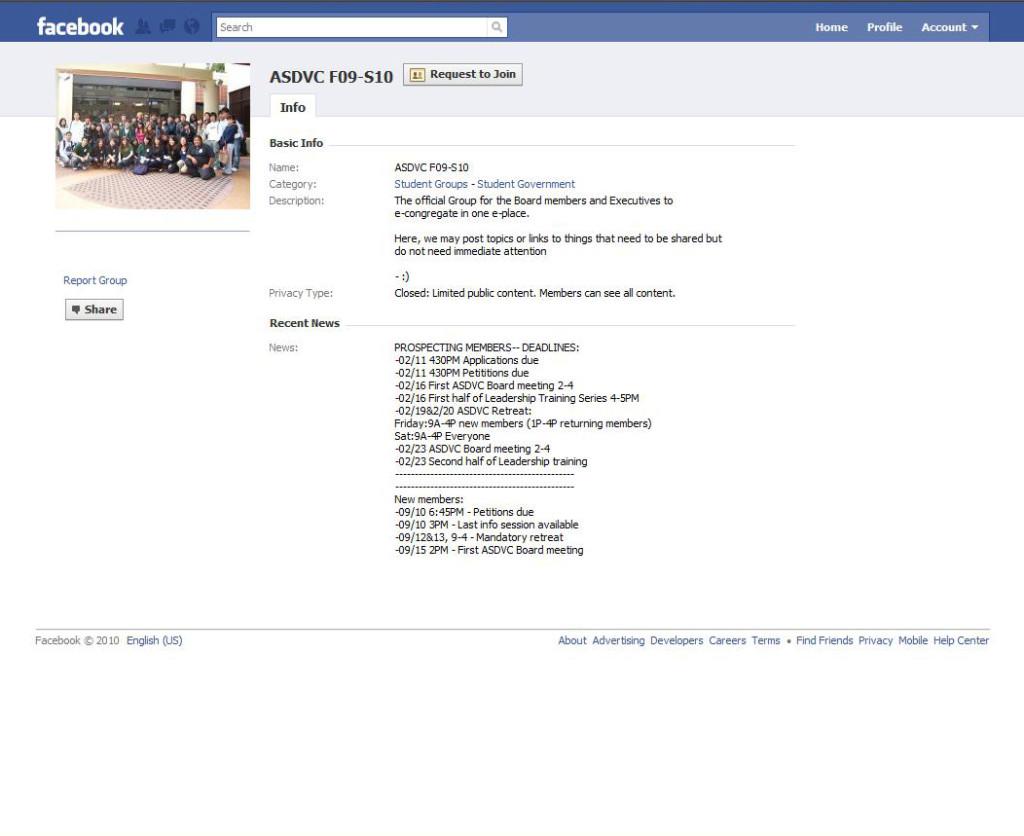The Associated Students of DVC risks violating California’s “open meeting law,” by maintaining a private “group page” on the popular social media site, facebook.com, according to two leading authorities on the law.
The description for the ASDVC’s page says it is the “official group” on Facebook for the student leaders to “e-congregate in one e-place.” The group is closed to the general public, with “limited public content” and only the group members can see what goes on within the group.
Terry Francke, general counsel for Californians Aware, suggests the ASDVC should “be careful with that concept, as it may ‘e-violate’ the ‘e-law,'” he said, referring to the group’s description.
If members discussed official ASDVC business, or “attended a meeting where action was taken that violated some provision of the Brown Act,” or if members intentionally meant to keep information from the public, then a misdemeanor penalty could be assessed, Francke said.
Section 54952.2(b)(1) of the Brown Act, which governs actions of such bodies as the ASDVC, states that members of such leadership groups not “use a series of communications of any kind” to “discuss, deliberate, or take action on any item of business that is within the subject matter jurisdiction of the legislative body.”
Other Associated Students groups with similar Facebook sites include Laney College, CSU’s San Diego and Fullerton, UCLA, UC Berkeley and the University of Washington.
But all of these are open to the public, unlike that of the ASDVC, which is solely for its own board members and executives.
Peter Scheer, general counsel for the First Amendment Coalition, emphasized that the law does not disallow the congregation of public leaders, only that they mustn’t discuss official business.
While making a Facebook page private doesn’t specifically violate the law, the secrecy of the group “undermines the legitimacy of any perception of transparency” of the organization, Scheer said.
Current ASDVC President Lindsay Hill, who created the page, said she had told board members not to discuss official business within the group, and therefore its existence does not violate the Brown Act.
“Everything ASDVC does is open to the public,” she said.
St. Hill acknowledged that other student government Facebook group pages are open to the public, but said she had wanted to make DVC’s group page “more special.” It was designed to be a place where board members and executives could post images and videos from ASDVC-only events, like their annual leadership retreat, she said.
Yet, the group’s members have not been active on the page for a long time, she said.
“[It was] something we tried to start up, but it kinda [sic] failed.” St. Hill said.
Brian Donovan, vice president of legislative affairs-elect and a member of the Facebook group, said he is “dismayed … and disgusted the group is private.” It should be open to the public to be used more like a bulletin board, he said.
Donovan said he will try to work with incoming ASDVC President Katerina Schreck to make Facebook “an important tool for organizing students.”
Bill Oye, the dean of student life and also a member of the Facebook group, said it “did not appear that it [the Facebook group] was being used to conduct ASDVC business, but rather as a social networking tool.”
St Hill said those concerned about transparency of the page can send a “request” to her and be added as a member of the group.
St. Hill said that she will be working to change the privacy settings of the group in order to allow the public to at least view the group’s “wall,” which is the main place for members to leave comments, or post links or other media.
The group was still closed to the public as of the Inquirer’s Tuesday night press deadline.
Contact Christopher C. Long at [email protected]









































































